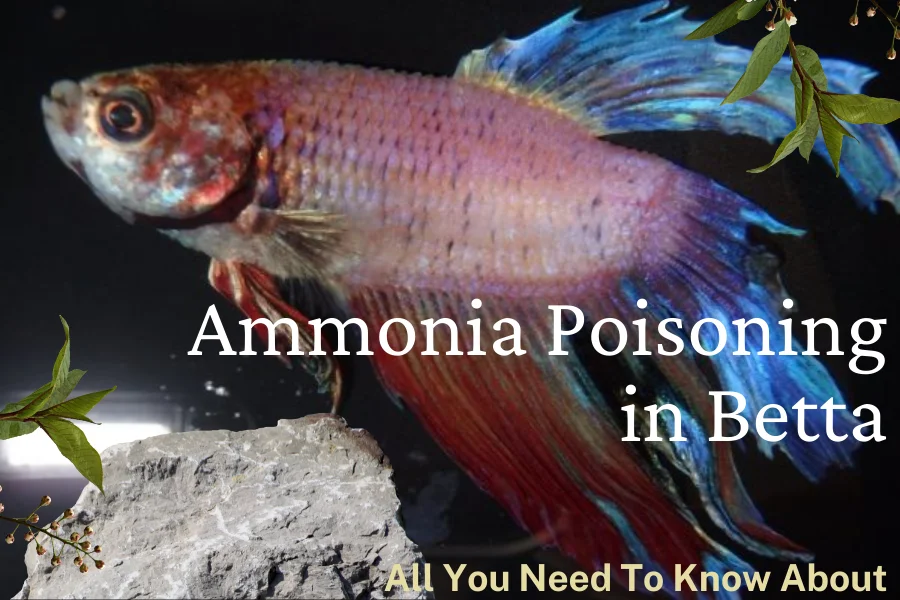If you are a fish owner, you might have heard about ammonia poisoning and its dangers to your fish. Ammonia poisoning is certainly one of the worst things that can happen to your fish. This is a concern for all betta owners as well. Ammonia poisoning in betta is a common and serious issue faced by betta owners.
We have prepared an informative guide for you, focusing on all needed to know regarding ammonia poisoning in betta fish. What exactly is ammonia poisoning? What causes the poisoning? What are the symptoms of ammonia poisoning? How to prevent ammonia poisoning? How to treat ammonia poisoning? We will answer all these questions as we move forward.
What Is Ammonia Poisoning In Fishes?

Due to its closed environment, fish tanks are susceptible to unwanted ammonia accumulation. This happens due to improper filtration of fish waste and leftover food molecules. Such high concentrations of ammonia in water cause the fish’s gills to burn, which in turn causes breathing difficulties. This can also lead to the death of the fish.
This generally happens in new tank setups when the tank water is not allowed to refresh properly, resulting in high ammonia levels in the water. This phenomenon can also happen in old tanks. In this case, it may be due to a fault in the filtration mechanism. Lack of certain bacterias (especially which help in ammonia) can also cause ammonia poisoning.
Recommended Reading | Betta Tail Biting Problem: Reasons and Resolution
Symptoms Of Ammonia Poisoning in Betta

You need to know the various symptoms of ammonia poisoning to detect any problem if there. Recognizing such symptoms is crucial in determining the treatment. Here are some of the signs which may indicate that your betta is suffering from ammonia poisoning:
- Loss of appetite – If your betta fish is not eating its food there is a high chance that it is sign of ammonia poisoning in betta.
- Gasping for air – You may see your betta fish swimming close to the surface of the water gasping for air. This means that your fish is having difficulty breathing. Such difficulty may be due to ammonia poisoning.
- Lilac gills – Notice the color of the fish’s gills. If they appear to be redish it is a definite sign of bleeding. This is one of the most prominent symptom of ammonia poisoning.
- Ulcers and streaks – Presence of ulcers and red streaks along the side of the betta fish’s body is also another sign of ammonia poisoning as it shows damage to the fish’s body tissues.
- Lethargic – If you see your betta behaving lazily, that is, if it stops swimming or lately just sits at the bottom of the tank, it may be due to ammonia poisoning.
Thus, if you suspect ammonia poisoning your betta fish, you should look for the above-mentioned symptoms and act accordingly.
Causes For Ammonia Poisoning in Betta
There are various causes for the level of ammonia to rise in the tank water. Knowing the cause behind the rising ammonia level is vital as the method of prevention depends on it. Here are some of the causes behind high concentrations of ammonia which may lead to ammonia poisoning:
- Leftovers and waste accumulation – Lack of proper and regular cleaning can cause food leftovers and fish waste to accumulate in the tank. These gradually synthsize to give rise to ammonia. This increases the level of ammonia in the water thereby causing ammonia poisoning.
- New tank setup – When you buy a new tank, it is advised you put a fish in it after some time. This allows the tank to complete its filtering process and become habitable. If the tank water is not allowed to refresh, it can cause ammonia poisoning in your betta fish.
- Faulty filtration system – A filtration system is the most important part of a fish tank. It ensures proper water conditions for your fish. If by chance there is any fault in the filtration system, there is a high chance the level ammonia will increase in the water.
- Lack of certain bacterias – There are certain bacterial groups which help in the decomposition of ammonium particles. Absence of such bacterias in the tank may cause increased levels of ammonia which in turn can cause ammonia poisioning.
If one identifies the cause of ammonia poisoning, its prevention becomes easier. Therefore, you need to determine the cause behind the rising ammonia. It may be due to any of the listed factors.
Treatment For Ammonia Poisoning in Betta
Even if your betta fish is suffering from ammonia poisoning, it does not mean that all hope is lost. There are some ways in which you can treat ammonia poisoning before it gets too serious. Following are some of how you can treat ammonia poisoning in betta:
- Perform water change – A water change will ensure a decrease in the ammonia level in the water. Keep in mind that you should not change the water all at once. Do it in parts till the ammonia level becomes zero.
- Change water filter – You can also add an ammonia removal filter to your filtration system. This will ensure a fall in the level of ammonia in the water.
- Limit betta food – You should also decrease the quantity of food you give to your betta fish. This decrases the amount of fish waste and food leftovers.
- Try isolating the fish – You can also try quarantining your betta fish and provide treatment.
One can try these methods to treat your betta fish. If it works, your fish will show signs of improvement within the first 5 days of treatment.
Prevention Of Ammonia Poisoning in Betta
Prevention is certainly better than cure. There are various ways in which one can prevent ammonia levels from rising in the tank water. It would help if you looked into the following ways to prevent ammonia poisoning:
- Periodical water changes – As mentioned earlier, lack of suffiecient water changes can cause ammonia to accumulate. You should perform regular water changes to keep the cleaning cycle going.
- Addition of bacteria – In case of new fish tanks, introduction of nitrifying bacteria is truly beneficial in decreasing the ammonia levels in the water. These bacterias help in the breakdown of ammonia molecules thereby making your tank safe and habitable.
- Conduct ammonia test – You should buy an ammonia testing kit to check the ammonium levels in the water. This will give you time to prevent ammonia poisioning in case ammonia level appear to be high.
- Controlled feeding – Do not over do with the betta food as it may lead to leftovers. These leftovers in turn can cause increased ammonia levels.
Thus, one can perform the following tasks before even running into the risk of ammonia poisoning in betta fish.
Ammonia Detoxifier

It would help if you also considered buying an ammonia detoxifier for your tank. It is worth noting that an ammonia detoxifier does not remove the ammonia from the tank water, but it neutralizes its effects on the betta fish. Ammonia detoxifiers work for both freshwater tanks and saltwater tanks.
Pros
- Detoxifies the ammonia present in the tank water
- No change in results for saltwater or freshwater
- Creates a stress-free enviornment for your fish
Cons
- Does not remove ammonia completely from the water
- Water changes and other procedures still necessary
- Has to be added every 2 days
Frequently Asked Questions (FAQs) Related to Ammonia Poisoning in Betta
Can ammonia poisoning kill betta fish?
YES. Ammonia poisoning can kill your betta fish if preventive measures are not taken soon. Look for symptoms and if any appear, start treatment immediately. Ammonia poisoning, if ignored, can lead to the death of your betta fish.
Does a water conditioner remove ammonia?
Good quality water conditioners can remove ammonia from the tank water. This prevents the ammonia level in the water from reaching too high.
How fast do the symptoms appear in ammonia poisoning?
It takes about 2 to 3 days for the symptoms to appear if your betta fish is exposed to too much ammonia. As soon as the symptoms appear, it is advised to start treatment immediately. If the ammonia level is too high, it may result in the sudden death of the betta fish.
Will 0.25 ppm ammonia kill betta fish?
Any level higher than 0.25 ppm ammonia is fatal for your fish. Although, it is strictly recommended to ensure that the ammonia level is 0 ppm in the tank water before adding your betta fish.
Final Words
Ammonia poisoning in betta fish is not something to be taken lightly. It is truly fatal for your betta fish and, if left unnoticed, can ultimately cause your fish to die. One should check the ammonia level in the tank water periodically to prevent such poisoning. If ammonia poisoning symptoms seem to appear, start treatment immediately. It includes decreasing ammonia levels in the water and limiting betta fish’s food intake.



